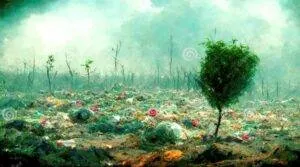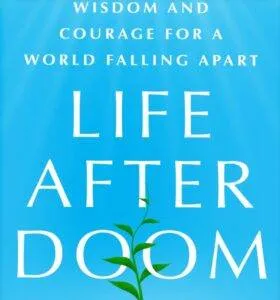Is our Society in need of the 12 step program?

Many of you will recognize these opening lines to the Serenity prayer, written by Reinhold Niebuhr, and used often in AA programs that follow the 12 step program.
God grant me the serenity
to accept the things I cannot change;
the courage to change the things I can;
and wisdom to know the difference.
Living one day at a time;
Enjoying one moment at a time;
Accepting hardships as the pathway to peace.
I found this prayer in the midst of reading the book Life after Doom, by Brian McLaren, [2] who leads the school in New Mexico supporting the teaching of the Franciscan monk Richard Rohr. I am studying the book with a group of 3rd order Franciscans as we grapple for our response to the ecological destruction of Nature and humanity we have unleashed upon the world. In Chapter 12 of the book he describes his experience with people in AA and then makes the connection of our current addiction to fossil fuels, fast food, and all the conveniences of modern industrial society which are have created a psychological state very similar that found in addicts: namely, we continue with behaviours that we KNOW will probably kill us in the long term but give us short term pleasure by meeting our short term needs.
Having been in a men’s group with former alcoholics and listened to their stories I see the same connection: our society breeds addiction and inaction and anxiety and feelings of being unworthy and self destructive behaviours which, worst of all, disconnect us from each other. Perhaps the commentary below about the social nature of addiction will help make this connection for you:
Addiction, in its simplest terms, is a complex brain disorder characterized by compulsive engagement in rewarding stimuli despite adverse consequences. But oh, if only it were that simple! The reality is far messier, far more nuanced, and far more heartbreaking. It’s a shape-shifting demon that can manifest in countless forms – from the bottle to the needle, from the casino to the smartphone. It’s a chameleon that adapts to our weaknesses, exploiting our deepest desires and fears. Throughout history, our perception of addiction has undergone a dramatic transformation. Once viewed as a moral failing, a sign of weak character or lack of willpower, we now understand addiction as a complex interplay of biological, psychological, and social factors. This shift in perspective hasn’t been easy, nor is it complete. Old stigmas die hard, and many still cling to outdated notions of addiction as a choice rather than a disease. But why should we care about understanding addiction’s social dimensions? Why not simply write it off as a personal problem, a private struggle? The answer, my friends, is because addiction is anything but private. Its tendrils reach far beyond the individual, entangling families, communities, and entire societies in its web. To truly grasp the nature of addiction, we must zoom out and examine its impact on the broader social landscape. [1]
There is overwhelming evidence, especially if you have realized that there is now line between the human and non-human worlds, that as we destroy Nature and murder other species we are committing suicide – just like alcoholics and drug addicts and gambling addicts do. Perhaps its time for all of us to participate in the 12 step program? In case you don’t know them, here are the 12 steps:
1. We admit that alone we were powerless over alcohol — that our lives had become unmanageable.
2. Came to believe that a Power greater than ourselves could restore us to sanity.
3. Made a decision to turn our will and our lives over to the care of that Higher Power as we understood Him/Her.
4. Made a searching and fearless moral inventory of ourselves.
5. Admitted to that Higher Power, to ourselves, and to another human being the exact nature of our wrongs.
6. Were entirely ready to have that Higher Power remove all these defects of character.
7. Humbly ask to remove our shortcomings.
8. Made a list of all persons we had harmed, and became willing to make amends to them all.
9. Made direct amends to such people wherever possible, except when to do so would injure them or others.
10. Continued to take personal inventory and when we were wrong promptly admitted it.
11. Sought through prayer and meditation to improve our conscious contact with our Higher Power as we understood Him/Her, praying only for knowledge of His will for us and the power to carry that out.
12. Having had a spiritual awakening as the result of these Steps, we tried to carry this message to alcoholics, and to practice these principles in all our affairs.
Quite honestly, given the state of our crumbling world and crumbling social connections I see this seemingly extreme path as one of the few options open to us that admits how self-destructive we have become and has a path forward towards Life. Of course, hard news in this path is the secret ingredient referred to as the “Higher Power” – something mysterious that is more than you or I are as individuals. The good news is that secret ingredient is up to you to find and up to define. So, what do you do? Find your higher power – whatever it is that gives life meaning in a Universe where we are but a speck of dust, for without it, all the evidence points to our belief that we can conquer our addiction for growth and more with its focus on immediate self-pleasure is a doomed path… and while you’re at, trying reading McLaren’s book Life after Doom, as recommended by Bill McKibben, American environmentalist, author, and journalist who has written extensively on the impact of global warming. He is the Schumann Distinguished Scholar at Middlebury College and leader of the climate campaign group 350.org.

References
1. https://neurolaunch.com/is-addiction-a-social-issue/#google_vignette
Leave a Reply